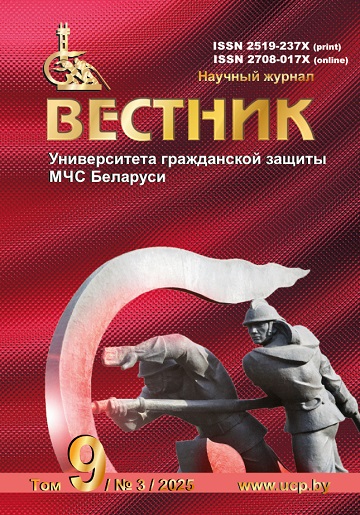Формирование научно-исследовательских компетенций у обучающихся очной формы получения общего высшего образования
DOI:
https://doi.org/10.33408/2519-237X.2025.9-3.410Ключевые слова:
научно-исследовательская компетенция, образовательный процесс, общее высшее образование, учреждение высшего образованияАннотация
Цель. Определение методологических подходов и направлений формирования научно-исследовательских компетенций у обучающихся очной формы получения общего высшего образования.
Методы. Теоретический анализ.
Результаты. Предложены направления формирования научно-исследовательских компетенций у обучающихся очной формы получения общего высшего образования. Показано, что реализация указанных направлений требует применения комплексного подхода, включающего интеграцию научных исследований в образовательный процесс, внедрение системы наставничества, стимулирование обучающихся и профессорско-преподавательского состава, развитие программ академической мобильности и позволяющего значительно повысить уровень научно-исследовательских компетенций у обучающихся, а также подготовить их к успешной профессиональной деятельности. Установлено, что образовательный процесс с элементами научно-исследовательской деятельности позволяет обучающимся не только углубить свои знания в конкретной области, но и развить навыки системного мышления, аналитического и критического анализа, а также умение работать с информацией и новыми технологиями. В ходе участия в научно-исследовательской деятельности обучающиеся не только развивают способности к рассуждению, обоснованию и аргументации своих выводов, а также к публичному представлению и защите результатов своей работы, но и осознают себя субъектом исследовательского процесса, приобретая при этом навыки решения научно-исследовательских задач.
Область применения исследований. Образовательный процесс очной формы получения общего высшего образования.
Библиографические ссылки
Polakov M., Horvathova-Suleimanova J., Madzík P., Copuš L., Molnárová I., Polednová J. Soft skills and their importance in the labour market under the conditions of Industry 5.0. Heliyon, 2023. Vol. 9, No. 8. Article e18670. 20 p. DOI: https://doi.org/10.1016/j.heliyon.2023.e18670.
Fugate M., Kinicki A.J., Ashforth B.E. Employability: a psycho-social construct, its dimensions, and applications. Journal of Vocational Behavior, 2004. Vol. 65, No. 1. Pр. 14–38. DOI: https://doi.org/10.1016/j.jvb.2003.10.005.
Prasad Ch., Gupta P. Educational impact on the society. International Journal of Novel Research in Education and Learning, 2020. Vol. 7, No. 6. Pp. 1–7. URL: https://www.noveltyjournals.com/upload/paper/paperpdf-1604924792.pdf.
Kromydas T. Rethinking higher education and its relationship with social inequalities: past knowledge, present state and future potential. Palgrave Communications, 2017. Vol. 3, No. 1. 12 p. DOI: https://doi.org/10.1057/s41599-017-0001-8.
Amirova A., Jeksembekova M.I., Taubayeva G.Z., Zhundibayeva T.N., Uaidullakyzy E. Creative and research competence as a factor of professional training of future teachers: Perspective of learning technology. World Journal on Educational Technology, 2020. Vol. 12, No. 4. Pp. 278–289. DOI: https://doi.org/10.18844/wjet.v12i4.5181.
Heleta S., Bagus T. Sustainable development goals and higher education: leaving many behind. Higher education, 2021. Vol. 81, Pp. 163–177. DOI: https://doi.org/10.1007/s10734-020-00573-8.
Abo-Khali A.G. Integrating sustainability into higher education challenges and opportunities for universities worldwide. Heliyon, 2024. Vol. 10, No. 9. Article e29946. 13 p. DOI: https://doi.org/10.1016/j.heliyon.2024.e29946.
Tiwari S.P., Fahrudin A. Evolving school dynamics and emerging technologies in education: Critical success factors. Calgary, Canada: SciFormat Publishing Inc., 2024. 45 p. DOI: https://doi.org/10.69635/978-1-0690482-0-2.
Spring J. Globalization of education: An introduction; 2nd ed. New York: Routledge, 2014. 244 р. DOI: https://doi.org/10.4324/9781315795843.
Kemp N. The international education market: some emerging trends. International Higher Education, 2016. Vol. 85. Pp. 13–15. DOI: https://doi.org/10.6017/ihe.2016.85.9238.
Weerasombat T., Pumipatyothin P., Napathorn C. Understanding employability in changing labor market contexts: the case of an emerging market economy of Thailand. Sustainability, 2022. Vol. 14, No. 16. Article 10436. 25 p. DOI: https://doi.org/10.3390/su141610436.
Mhlanga, D. Digital transformation of education, the limitations and prospects of introducing the fourth industrial revolution asynchronous online learning in emerging markets. Discover Education, 2024. Vol. 3. Article 32. 18 p. DOI: https://doi.org/10.1007/s44217-024-00115-9.
Kamalov F., Santandreu Calonge D., Gurrib I. New era of artificial intelligence in education: towards a sustainable multifaceted revolution. Sustainability, 2023. Vol. 15, No. 16. Article 12451. 27 p. DOI: https://doi.org/10.3390/su151612451.
Tien H.L., Van N.P., Kato T. Development of evaluation criteria for training fire students to enable new rescue roles in Vietnam. Journal of Disaster Research, 2024. Vol. 19, No. 2. Pр. 411–419. DOI: https://doi.org/10.20965/jdr.2024.p0411.
Wang S., Huang X. A review on higher education of fire safety in China. Fire Technology, 2024. Vol. 60. Рр. 757–816. DOI: https://doi.org/10.1007/s10694-023-01416-5.
Bennett N., Lemoine G.J. What a difference a word makes: understanding threats to performance in a VUCA world. Business Horizons, 2014. Vol. 57, No. 3. Pp. 311–317. DOI: https://doi.org/10.1016/j.bushor.2014.01.001.
GreičiūtėA. The impact of environmental uncertainty on career management. Public Security and Public Order, 2023. Vol. 34. Pp. 82–93. DOI: https://doi.org/10.13165/pspo-23-34-02.
Palevoda I.I., Zhamoydik S.M., Zaynudinova N.V., Nekhan' D.S. Ognestoykost' sovremennykh stroitel'nykh konstruktsiy iz zhelezobetona [Fire resistance of modern reinforced concrete building structures]: monograph. Ed. by I.I. Palevoda. Minsk: University of Civil Protection, 2023. 420 p. (rus)
Grachev A.A. Tekhnologiya formirovaniya gotovnosti k professional'noy deyatel'nosti u sotrudnikov GPS MChS Rossii [Technology of readiness formation for professional activity among the employees of the State Fire Service of the Ministry of Emergency Situations of Russia]. Uchenye zapiski universiteta imeni P.F. Lesgafta, 2011. Vol. 77, No. 7. Pp. 47–53. (rus). EDN: https://elibrary.ru/MNMOFK.
Cai G., Zheng X., Guo J., Gao W. Real-time identification of borehole rescue environment situation in underground disaster areas based on multi-source heterogeneous data fusion. Safety Science, 2025. Vol. 181. Article 106690. DOI: https://doi.org/10.1016/j.ssci.2024.106690.
Obrazovanie v Respublike Belarus'. Statisticheskiy buklet [Education in the Republic of Belarus. Statistical data book]. Ed. by I. Medvedeva. Minsk: National statistical committee of the Republic of Belarus, 2024. 35 р. (rus)
Shi Y., Bangpan M. Young people’s participation experiences of technical and vocational education and training interventions in low- and middle-income countries: a systematic review of qualitative evidence. Empirical Research in Vocational Education and Training, 2022. Vol. 14, Article 8. 42 p. DOI: https://doi.org/10.1186/s40461-022-00136-4.
Sharyy I.N. Osobennosti vosproizvodstva nauchnykh kadrov v Belarusi i problemy kadrovogo obespecheniya prioritetnykh napravleniy nauchnykh issledovaniy: sotsiologicheskiy analiz [Reproductive specifics of the scientific staff in Belarus and the problems of staffing of the scientific research priority lines: sociological analysis]. Sotsiologicheskiy al'manakh, 2016. Vol. 7. Pp. 199–207. (rus). EDN: https://elibrary.ru/XHWSGX.
Bednyy B.I., Rybakov N.V., Zhuchkova S.V. O vliyanii institutsional'nykh transformatsiy na rezul'tativnost' rossiyskoy aspirantury [The effects of institutional transformations on the russian doctoral education performance]. Higher Education in Russia, 2022. Vol. 31, No. 11. Pp. 9–29. (rus). DOI: https://doi.org/10.31992/0869-3617-2022-31-11-9-29. EDN: https://elibrary.ru/RHANGJ.
Shchurok E.M. Podgotovka nauchnykh kadrov vysshey kvalifikatsii v Respublike Belarus': regional'nye osobennosti [Training of scientific personnel of higher qualification in the Republic of Belarus: regional features]. Sotsiologicheskiy al'manakh, 2023. Vol. 14. Pp. 145–156. (rus). EDN: https://elibrary.ru/FSNOTM.
Kaptan K., Timurlenk O. Challenges for science education. Procedia – Social and Behavioral Sciences, 2012. Vol. 51. Pp. 763–771. DOI: https://doi.org/10.1016/j.sbspro.2012.08.237.
Маrushkevych А.A., Zvarych I.M., Romanyshyna O.Y., Malaniuk N.M., Grynevych O.L. Development of students’ research competence in the study of the humanities in higher educational institutions. Journal of Curriculum and Teaching, 2022, Vol. 11, No. 1. Рр. 15–24. DOI: https://doi.org/10.5430/jct.v11n1p15.
Hazelkorn E., Gibson A. Global science, national research, and the question of university rankings. Palgrave Communications, 2017. Vol. 3. Article 21. 11 p. DOI: https://doi.org/10.1057/s41599-017-0011-6.
Ozhegov S.I., Shvedova N.Yu. Tolkovyy slovar' russkogo yazyka [Explanatory dictionary of the Russian language]. 4nd ed., supplemented. Moscow: Azbukovnik, 1997. 939 p. (rus)
Bol'shoy entsiklopedicheskiy slovar' [Large encyclopedic dictionary]. Chief editor: A.M. Prokhorov. Moscow: Sovetskaya entsiklopediya, 2002. 1628 p. (rus)
Kolodkina N.N., Cheremukhin A.D. O mnozhestvennosti traktovok termina «kompetentsiya» [About the multiplicity of interpretations of the term "competence"]. Karelian Scientific Journal, 2016. Vol. 5, No. 4. Pp. 24–28. (rus). EDN: https://elibrary.ru/XIEWZH.
Akbaeva, M.D. Ponyatie «issledovatel'skaya kompetentnost'» v pedagogicheskoy teorii [The concept of "research competence" in the theory of education]. Pedagogical Journal, 2016. Vol. 6, No. 6A. Pp. 268–282. (rus). EDN: https://elibrary.ru/ZBHUWJ.
Khutorskoy A.V. Didaktika [Didactics]. Saint Petersburg: Piter, 2017. 718 p. (rus)
Shestak V.P., Shestak N.V. Formirovanie nauchno-issledovatel'skoy kompetentsii i «akademicheskoe pis'mo» [Research competence and academic writing]. Higher Education in Russia, 2011. No. 12. Pp. 115–119. (rus). EDN: https://elibrary.ru/OMTRVL.
Опубликован
Как цитировать
Лицензия
Все права защищены (c) 2025 Пасовец В.Н., Ковтун В.А.

Это произведение доступно по лицензии Creative Commons «Attribution-NonCommercial» («Атрибуция — Некоммерческое использование») 4.0 Всемирная.




















